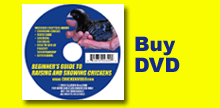BIRD & AVIAN FLU INFORMATION
The latest news stories about this disease have backed off from their earlier treatment that made the new bird or avian flu strain sound like it will be the next pandemic. Knowing a bit about chicken diseases, I know that various strains of Avian flu have been around for centuries. There are some basic rules for poultry care that will help protect your flock (and you).
Keep your flock separated from wild birds in a fenced yard with netting overhead will reduce the chance of transmission -bird flu is just like any human flu, the germs have to come from another animal.
Viruses can be found in excrement, feathers, blood, spit and nasal secretions, avoid contamination.Wash your hands with soap and water after touching any bird.
After handling your chickens, do not touch any food, your nose, eyes or mouth before you wash your hands.Cook chicken flesh and eggs thoroughly.
When a chicken dies, put on rubber gloves before touching it, wrap it tightly in a sealed plastic bag and dispose of the bird properly.Observe basic flock and personal sanitation as described in the 'preventing avian flu' and other articles below.
USDA Avian Flu Information Page
UC Davis Avian Flu Information Page
Studies Suggest Pandemic Isn't Imminent
BBC News: Risk of Human Outbreak 'Low'
Corporations and Chicken Factories Prep for Flu
Cornell University site monitoring Avian flu in US
Avian flu fact sheet and many links
Center for Disease Control Avian Flu fact sheet
Poultry handling practices during a flu outbreak
Fact sheet about the flu from USDA
Overview of Avian Flu symptoms in birds with pictures



